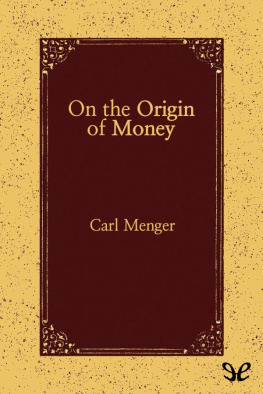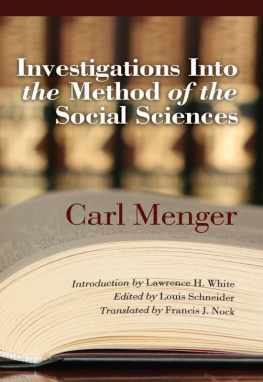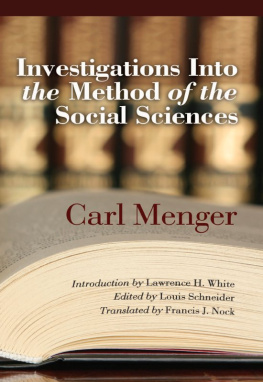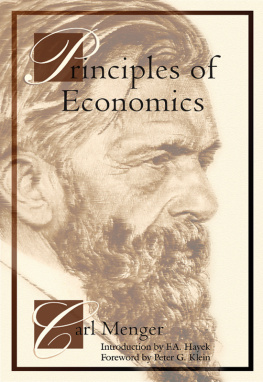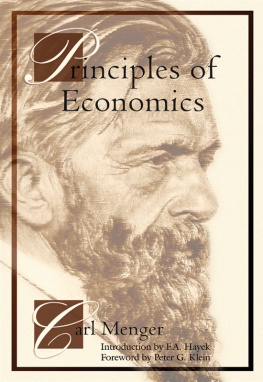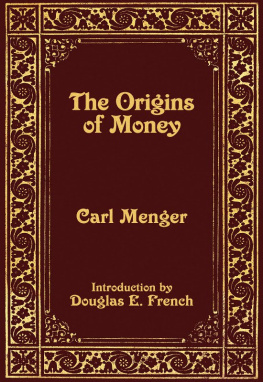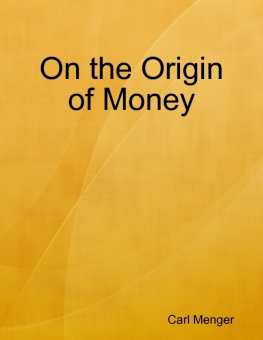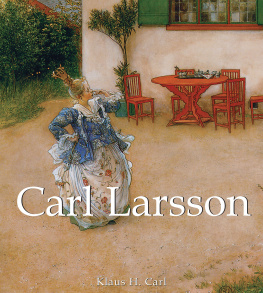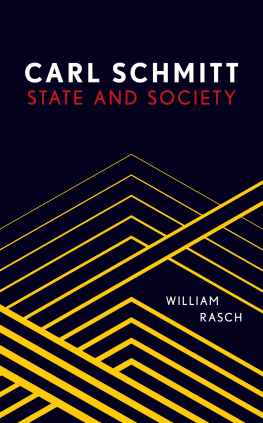Carl Menger - On the Origin of Money
Here you can read online Carl Menger - On the Origin of Money full text of the book (entire story) in english for free. Download pdf and epub, get meaning, cover and reviews about this ebook. year: 1892, publisher: ePubLibre, genre: Science. Description of the work, (preface) as well as reviews are available. Best literature library LitArk.com created for fans of good reading and offers a wide selection of genres:
Romance novel
Science fiction
Adventure
Detective
Science
History
Home and family
Prose
Art
Politics
Computer
Non-fiction
Religion
Business
Children
Humor
Choose a favorite category and find really read worthwhile books. Enjoy immersion in the world of imagination, feel the emotions of the characters or learn something new for yourself, make an fascinating discovery.
- Book:On the Origin of Money
- Author:
- Publisher:ePubLibre
- Genre:
- Year:1892
- Rating:3 / 5
- Favourites:Add to favourites
- Your mark:
- 60
- 1
- 2
- 3
- 4
- 5
On the Origin of Money: summary, description and annotation
We offer to read an annotation, description, summary or preface (depends on what the author of the book "On the Origin of Money" wrote himself). If you haven't found the necessary information about the book — write in the comments, we will try to find it.
On the Origin of Money — read online for free the complete book (whole text) full work
Below is the text of the book, divided by pages. System saving the place of the last page read, allows you to conveniently read the book "On the Origin of Money" online for free, without having to search again every time where you left off. Put a bookmark, and you can go to the page where you finished reading at any time.
Font size:
Interval:
Bookmark:

Written in the same year that he testified before the Currency Commission in Austria-Hungary, and published in English in 1892, Carl Menger explains that it is not government edicts that create money but instead the marketplace. Individuals decide what the most marketable good is for use as a medium of exchange. Man himself is the beginning and the end of every economy, Menger wrote, and so it is with deciding what is to be traded as money.

Carl Menger
ePub r1.2
Titivillus 13.03.16
Ttulo original: On the Origin of Money
Carl Menger, 1892
Diseo: Titivillus
Editor digital: Titivillus
ePub base r1.2
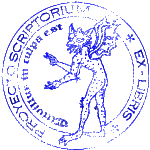
[1] Cf. Roscher, System Der Volkswirthscaft, I sec. 116; my Grunsatze der Volkswirischaftslehre, 1871, p. 255, et seq.; M. Block, Les Progres de la Science economique depuis A. Smith, 1890, II. p. 59, et seq.
[2] We must make a distinction between the higher purchasing prices for which the buyer is rendered liable through the wish to purchase at a definite point of time, and the (lower) selling prices, which he, who is obliged to get rid of goods within a definite period, must content himself withal. The smaller the difference between the buying and selling of an article, the more saleable it usually proves to be.
[3] The height of saleableness in a commodity is not revealed by the fact that it may be disposed of at any price whatever, including such as result from distress or accident. In this sense all commodities are pretty well equally saleable. A high rate of saleableness in a commodity consists in the fact that it may at every moment be easily and surely disposed of at a price corresponding to, or at least not discrepant from, the general economic situation at a economic, or approximately economic, price. The price of a commodity may be denoted as uneconomic on two grounds: (1) in consequence of error, ignorance, caprice, and so forth; (2) in consequence of the circumstance that only a part of the supply is available to the demand, the rest for some reason or other being withheld, and the price in consequence not commensurate with the actually existing economic situation.
[4] Cf. my article on 'Money' in the Handwurterbuch der Staatswissenschaften (Dictionary of Social Science), Jena, 1891, iii, p. 730 et seq.
[5] The Hebrew Keseph, the Greek argurion, the Latin argentum, the French argent, etc.
[6] The English money, the Spanish moneda, the Portuguese moeda, the French monnaie, the Hebrew maoth, the Arabic fulus, the Greek nomisma, etc.
[7] The Italian danaro, the Russian dengi, the Polish pienondze, the Bohemian and Slavonian penise, the Danish penge, the Swedish penningar, the Magyar pens, etc. (i.e. denare = Pfennige = penny).
[8] Cf. on this point my Grunsatze der Volkswirtschaftslehre , 1871, p. 250 et seq.
[9] Herein lies the explanation of the circumstances why compulsory sales, and cases of distraint in particular, involve as a rule the economic ruin of the person upon whose estate they are carried out, and that in a greater degree the less the goods in question are saleable. Correct discernment of the uneconomic character of these processes will necessarily lead to a reform in the available legal mechanism.
There is a phenomenon which has from of old and in a peculiar degree attracted the attention of social philosophers and practical economists, the fact of certain commodities (these being in advanced civilizations coined pieces of gold and silver, together subsequently with documents representing those coins) becoming universally acceptable media of exchange. It is obvious even to the most ordinary intelligence, that a commodity should be given up by its owner in exchange for another more useful to him. But that every economic unit in a nation should be ready to exchange his goods for little metal disks apparently useless as such, or for documents representing the latter, is a procedure so opposed to the ordinary course of things, that we cannot well wonder if even a distinguished thinker like Savigny finds it downright 'mysterious.'
It must not be supposed that the form of coin, or document, employed as current-money, constitutes the enigma in this phenomenon. We may look away from these forms and go back to earlier stages of economic development, or indeed to what still obtains in countries here and there, where we find the precious metals in a uncoined state serving as the medium of exchange, and even certain other commodities, cattle, skins, cubes of tea, slabs of salt, cowrie-shells, etc.; still we are confronted by this phenomenon, still we have to explain why it is that the economic man is ready to accept a certain kind of commodity, even if he does not need it, or if his need of it is already supplied, in exchange for all the goods he has brought to market, while it is none the less what he needs that he consults in the first instance, with respect to the goods he intends to acquire in the course of his transactions.
And hence there runs, from the first essays of reflective contemplation of a social phenomena down to our own times, an uninterrupted chain of disquisitions upon the nature and specific qualities of money in its relation to all that constitutes traffic. Philosophers, jurists, and historians, as well as economists, and even naturalists and mathematicians, have dealt with this notable problem, and there is no civilized people that has not furnished its quota to the abundant literature thereon. What is the nature of those little disks or documents, which in themselves seem to serve no useful purpose, and which nevertheless, in contradiction to the rest of experience, pass from one hand to another in exchange for the most useful commodities, nay, for which every one is so eagerly bent on surrendering his wares? Is money an organic member in the world of commodities, or is it an economic anomaly? Are we to refer its commercial currency and its value in trade to the same causes conditioning those of other goods, or are they the distinct product of convention and authority?
Thus far it can hardly be claimed for the results of investigation into the problem above stated, that they are commensurate either with the great development in historic research generally, or with the outlay of time and intellect expended in efforts at solution. The enigmatic phenomenon of money is even at this day without an explanation that satisfies; nor is there yet agreement on the most fundamental questions of its nature and functions. Even at this day we have no satisfactory theory of money.
The idea which lay first to hand for an explanation of the specific function of money as a universal current medium of exchange, was to refer it to a general convention, or a legal dispensation. The problem, which science has here to solve, consists in giving an explanation of a general, homogeneous course of action pursued by human beings when engaged in traffic, which, taken concretely, makes unquestionably for the common interest, and yet which seems to conflict with the nearest and immediate interests of contracting individuals. Under such circumstances what could lie more contiguous than the notion of referring the foregoing procedure to causes lying outside the sphere of individual considerations? To assume that certain commodities, the precious metals in particular, had been exalted into the medium of exchange by general convention or law, in the interest of commonweal, solved the difficulty, and solved it apparently the more easily and naturally inasmuch as the shape of the coins seemed to be a token of state regulation. Such in fact is the opinion of Plato, Aristotle, and the Roman jurists, closely followed by the mediaeval writers. Even the more modern developments in the theory of money have not in substance got beyond this standpoint.
Font size:
Interval:
Bookmark:
Similar books «On the Origin of Money»
Look at similar books to On the Origin of Money. We have selected literature similar in name and meaning in the hope of providing readers with more options to find new, interesting, not yet read works.
Discussion, reviews of the book On the Origin of Money and just readers' own opinions. Leave your comments, write what you think about the work, its meaning or the main characters. Specify what exactly you liked and what you didn't like, and why you think so.

